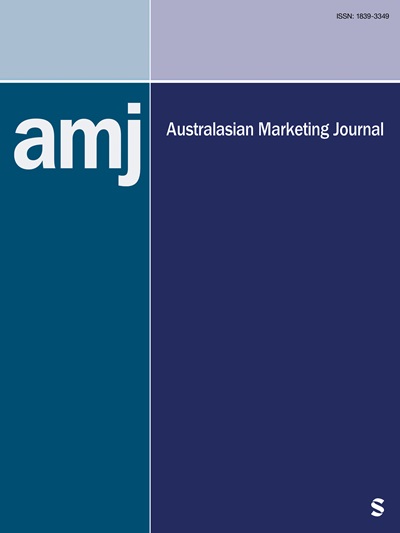创造性元技能:营销专业人员的结构、维度和含义
IF 4
Q2 BUSINESS
引用次数: 0
摘要
创造性技能通常被认为是营销专业人员的重要资产。前所未有的技术驱动的转变进一步强调了对营销创造力的需求。然而,学者和实践者对获得创造性技能所需的能力的理解是缺乏的,考虑到这些能力和创造力在营销中的重要性,这是一个值得关注的问题。因此,我们的研究旨在解决以下研究问题:(1)什么是创造性元技能(即获得创造性技能所需的能力)?(2)这个构念与其他相关构念有何关联?为了解决这些问题,我们定义了创造性元技能的结构,以心流理论为基础,并描绘了它的维度——即创造性成长心态、勤奋和对反馈的开放态度。在此基础上,运用刺激-有机体-反应(S-O-R)模型,通过创造性个人同一性(CPI)和创造性自我效能感(CSE)将创造性元技能与创造性绩效联系起来,并通过两项研究对这一关系进行实证检验。从理论上讲,本文通过完善创造性元技能的结构和提供一个概念框架,对市场营销中元技能和创造力的文献做出了贡献。这个主题将是对市场营销课程的一个有价值的补充。此外,公司可以利用这项研究的见解来提高他们的营销专业人员的创造力。创意产业/角色的招聘过程将受益于在评估标准中考虑创意元技能、CPI和CSE。论文最后指出了自身的局限性和未来的研究方向。本文章由计算机程序翻译,如有差异,请以英文原文为准。
Creative Meta-Skills: Construct, Dimensions and Implications for Marketing Professionals
Creative skills are often regarded as a vital asset for marketing professionals. Unprecedented technology-driven shifts have further accentuated the need for creativity in marketing. However, scholars and practitioners’ understanding of the capabilities required to acquire creative skills is lacking, which is a matter of concern given the importance of these capabilities and creativity in marketing. Our study thus aims to address the following research questions: (1) What are creative meta-skills (i.e. capabilities required to acquire creative skills)? and (2) How is this construct related to other relevant constructs? In addressing these questions, we define the construct of creative meta-skills, anchored in flow theory and delineate its dimensions – that is, creative growth mindset, diligence and openness to feedback. Further, using the stimulus-organism-response (S-O-R) model, we relate creative meta-skills to creative performance through creative personal identity (CPI) and creative self-efficacy (CSE) and empirically test this relationship via two studies. Theoretically, this paper contributes to the literature on meta-skills and creativity in marketing (CiM) by refining the construct of creative meta-skills and by providing a conceptual framework. This topic will be a valuable addition to the marketing curriculum. Further, firms can use this study’s insights to enhance their marketing professionals’ creativity quotient. The hiring process for creative industries/roles would benefit by considering creative meta-skills, CPI and CSE in the evaluation criteria. The paper ends with a note on its own limitations and directions for future research.
求助全文
通过发布文献求助,成功后即可免费获取论文全文。
去求助
来源期刊

Australasian Marketing Journal
BUSINESS-
CiteScore
14.90
自引率
16.70%
发文量
25
期刊介绍:
The Australasian Marketing Journal (AMJ) is the official journal of the Australian and New Zealand Marketing Academy (ANZMAC). It is an academic journal for the dissemination of leading studies in marketing, for researchers, students, educators, scholars, and practitioners. The objective of the AMJ is to publish articles that enrich and contribute to the advancement of the discipline and the practice of marketing. Therefore, manuscripts accepted for publication will be theoretically sound, offer significant research findings and insights, and suggest meaningful implications and recommendations. Articles reporting original empirical research should include defensible methodology and findings consistent with rigorous academic standards.
 求助内容:
求助内容: 应助结果提醒方式:
应助结果提醒方式:


